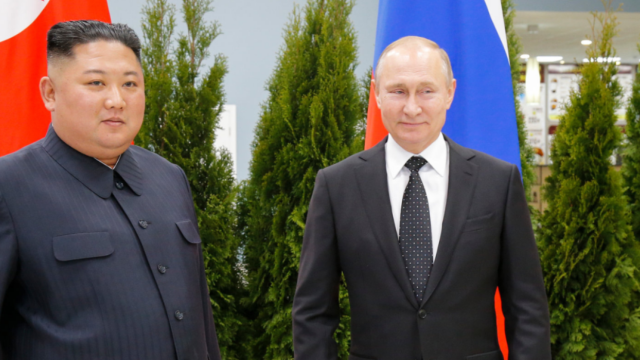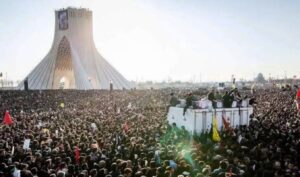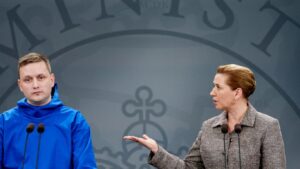The grand military parade and high-level summit in China sent a clear message to Europe that its security will never be the same again. Specifically, the warm reception of Vladimir Putin and the fact that the Russian leader stood side-by-side at events in China with his Chinese counterpart Xi Jinping, Indian Prime Minister Narendra Modi, Iranian President Masoud Pezeshkian, and North Korean leader Kim Jong Un was a clear message to Ukraine and its European allies that Moscow can continue its course, as it has strong and determined allies by its side.
CNN analysis: Putin’s warm China reception sends clear message to Europe about its security
Russia could not continue the war without China’s and India’s economic support, weapons from Iran, and to a lesser extent, personnel from North Korea. Almost three years after the start of the war in Ukraine, the messages from both the Summit and the military parade transcend the Ukraine war.
According to CNN’s analysis on the matter, despite the fact that the leaders gathered in China don’t agree on everything, they set aside their differences as they see an opportunity to end Western dominance on the international stage, while Europe worries it may become a target and perhaps needs to reconsider its security.
Europe has spent recent years trying to isolate Putin and deprive Russia’s economy, while simultaneously realizing that the US may no longer be the ally it can always turn to. On the other hand, Russia is there, with the world’s strongmen at its side, confirming their friendship. As Natia Seskuria, researcher at the Royal United Services Institute (RUSI) told CNN: “Russia is trying to show that, although it has been isolated by the Western world, it still has partners and allies that are economically powerful countries… And this isolation doesn’t mean that the Russian economy will collapse or that Russia won’t be able to sustain its war efforts”.
After the end of the Cold War, the international order that was formed now risks collapsing. The US is retreating from the international stage under Donald Trump’s presidency and his “America First” agenda. Meanwhile, Europe is struggling with its own problems, such as the rise of far-right nationalism and economic pressures. Russia, China, India and other countries that didn’t want a world under US hegemony suddenly saw a first-class opportunity.
John Lau, head of foreign policy at the think tank New Eurasian Strategies Centre told CNN: “The established dominance of the Western Alliance in international affairs is receding, and they see the opportunity to seriously begin reshaping the international system”.
This week clearly revealed these ambitions to everyone, even to Trump, with the American president receiving the message, writing in his message to Xi: “Please give my warm regards to Vladimir Putin and Kim Jong Un as you conspire against the United States of America”.
Terms and conditions
According to analysts, despite the handshakes and smiles, China’s and India’s stance toward Russia’s war in Ukraine is primarily driven by pragmatism. Both countries maintain a consistently neutral stance on the war while simultaneously strengthening it through financial support to Russia.
China and India didn’t hide their joy when Ukraine’s Western allies imposed sanctions on Russian oil, a significant source of revenue for Moscow. They’re getting cheaper energy supplies, but experts say the relationship isn’t just about money. Despite neither China nor India being willing to engage in direct confrontation with the West, both are pleased that Russia is promoting an anti-Western agenda.
Beijing and New Delhi are now the two largest buyers of Russian oil and coal, with China also being the second-largest buyer of Russian natural gas and petroleum products. The support goes beyond oil. According to the US Treasury Department, Chinese and Indian companies supply Russia with dual-use technologies, or components that can be used for both civilian and military purposes, such as chips or telecommunications equipment that Russia can’t obtain elsewhere due to Western sanctions.
“One only needs to look at the number of Chinese components in Russian drones landing in Ukraine to understand that China is a very important supplier,” Lau added.
At the same time, Ukraine and its European allies are unwilling to completely ignore India and China, because they know that, if anyone can exert real pressure on Putin to end the war – lacking more stringent actions from Trump – it’s likely Beijing and, perhaps to a lesser extent, New Delhi.
Meanwhile, steadily standing by Russia’s side are North Korea and Iran. Already under sanctions and isolated by the West due to their nuclear programs and other activities, they don’t have much to lose. Iran was particularly useful to Moscow in the early months of the war, providing expertise on how to reduce the impact of sanctions. Additionally, it offered valuable military material, including the Shahed drone, a weapon that has significantly changed how Russia fights in Ukraine.
The two countries signed another new cooperation agreement and began joint military exercises. However, Tehran learned the hard way that any alliance with Russia has clear limits. Putin didn’t help Iran when it was attacked by Israel and later by the US in the summer. And beyond providing safe passage to former Syrian president Bashar al-Assad, a former key ally of Russia and Iran, Putin didn’t intervene when the Assad regime was overthrown in December.
The relationship with Russia is a transaction for isolated North Korea. Russia needs men, and North Korea is probably the only country that can politically send its own population to fight in a war with very high casualties for the Russian side.
The developments in China weren’t sudden. Europe may have been surprised by Russia’s full invasion of Ukraine, but since then the security map has changed dramatically. Things that would have been unthinkable just a few years ago are now happening due to the geopolitical changes that emerged this week.
Despite Putin’s friendly stance toward Xi and Modi, which caused discomfort in many European capitals, the three leaders found themselves united thanks to a combination of necessity, economic realism and opportunity, according to analysts. Concluding, John Lau, head of foreign policy at the think tank New Eurasian Strategies Centre notes that: “It’s a very functional relationship, not based on strong mutual affection. It’s an alliance of interests, not countries,” adding that interests can change, and much can happen in the next 3.5 years of Trump’s presidency.




